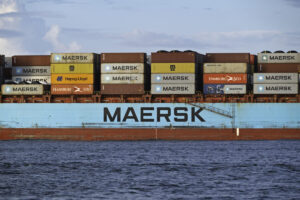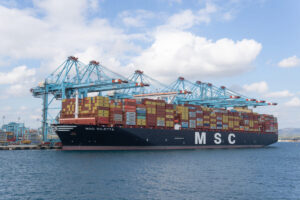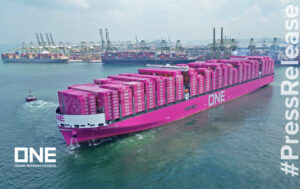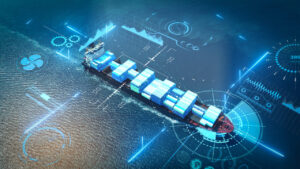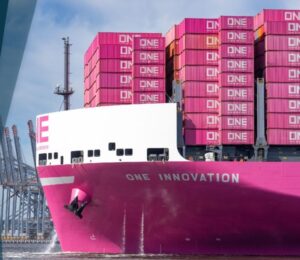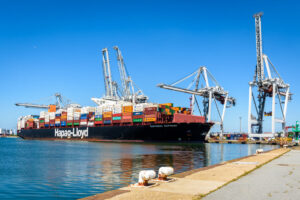In March 2019, Port Technology spoke exclusively to Dr Eva Savelsberg, Senior Vice-President, INFORM, on the major trends in the maritime industry, including smart, exponential technologies and artificial intelligence (AI).
Since then Dr Savelsberg was a keynote speaker at Port Technology’s Container Terminal Automation Conference (#CTAC19) where part two of INFORM’s 2038: A Smart Port Story novella was published, in London, UK, and also a key participant at TOC Europe in Rotterdam, the Netherlands.
Part three of 2038 will be released at Port Technology’s Smart Digital Ports of the Future (#SDP19), which will be held in Rotterdam 4-6 November 2019.
Recently, Dr Savelsberg once again spoke to Port Technology to reflect on the past few months and look ahead to the future.
Discover INFORM’s solutions for ports and terminals by exploring their AIS portal

Port Technology: When you look at the maritime industry today, what do you see? What do you think are the technological trends that will influence it in the coming years?
Dr Savelsberg: I think we are in a decisive moment. I think for quite a couple of decades, we tried to master automation but have not been entirely successful.
It took us quite a time to find ways, and probably we are not there yet, to get processors and, for example, software and hardware, to work in a smooth way with each other.
But it is a learning curve. We know automation will be decisive in the future, but we still have to think about the lessons learned and implement ways and tools to be successful.
I like the methodology of Cyber-physical Systems, because that gives you an idea as to why it is important to look at the different angles which come together in automated processes.
There’s a human who has specific demands and specific ways to work and to think; and then there are the hardware components – the sensors, the software coming in, the interfaces between all these different elements.
And as I said, we are working on a way to bring it together and to be successful, but we are not there yet.
We know we have to go there, but we are not well equipped yet. And now that trend is artificial intelligence and machine learning, it’s just omnipresent, and it’s about to change our future in quite a broader sense, I would say.

Port Technology: You played quite a big part in both CTAC 2019 here in London and also TOC Europe in Rotterdam. How would you judge the mood of the industry, having attended those two events? What have been your key highlights so far this year?
Dr Savelsberg: I think one element ties in with what I said before, which there is a lot of discussion about automation and its value. So that’s a big discussion point.
As well as that, there’s still plenty of conversation around data standards. Because we tend to have a couple of silos where data is gathered and where we work with data, but between the silos, it’s still very difficult to exchange data in an appropriate way – to exchange the right data at the right point in time.
Again, we have to become better there and find better ways. And in a way, it’s also a nice picture, because to exchange data also means to work together more closely, not only on a technical level, but also on an inter-company level. It’s not possible anymore to be just competitors. You have to define your role in a more flexible way.
You might be, in a general sense, a competitor, but for specific projects, you have to cooperate with partners. And you have to exchange a lot of the very valuable things you have which are the data and your results.
And probably, also, you have to sometimes lift the curtain a bit and talk about it all. Like, “Okay, how are you doing it?”, and “What do you need, and what can you bring to the table?”
So, that’s very interesting, this play of competition and cooperation, because I think it ends at a different stage.

Port Technology: Taking a little bit more of a broader look, aside from ports and terminals, where in the supply chain do you see artificial intelligence, machine learning, and other instances of technologies having the greatest impact?
Dr Savelsberg: It’s not a thing of the future, but today. I think it already has had quite an impact, but we sometimes might not realize it. It will have even bigger impact in the future because I think it will be interwoven into every process, every software there is.
Because you will get, or you will have the possibility to gain, so much insight about the past and how things work together. And, you can also gain insight into things which were, until now, just a “black box” to you.
Customers can gain quite a bit of insight about their suppliers because by using machine learning, they can analyze the results of whatever they bought and get some knowledge about how they probably work and what are probably the little screws and links they are using.
I think that will lead to different phases of the usage of artificial intelligence. Because I think there will be something like, when they find gold, everybody was excited because in some corner. You found gold, and everybody was rushing there.
We are a bit before this point in time because only now we have found out, or everybody kind of finds out, how easy it is to download a machine learning engine and to use it and to get high-quality results.
But soon, also, and some already have found out, that getting results is pretty easy, you just have to put in a hell of a lot of manual work. By now, it’s about 80% manual work to shape the data or to clean the data, to prepare the data, so it’s not kind of garbage-in, garbage-out.
And that is not scalable. So, you have to have the knowledge, the experience, and the background to really get big results and big insights so you can get to see the bigger picture and to make use of it.
That will be the next phase. We are already working on that, so those are kind of in parallel.
And we also have the nice advantage because we [INFORM] have been in artificial intelligence for 50 years so we have the ability to use the insights about the past and then put what we call “operations research,” or actually the discipline is called operations research, on top of it.
Because that offers the possibility to make use of the wisdom of the past, and not only have the wisdom, but with operations research, you can then put it all together in a mathematical way and put strategies in place to also shape the future.

Port Technology: Millennials will comprise 75% of the maritime workforce by the year 2025. Do you think there’s a chance that technologies such as artificial intelligence and machine learning will become mainstream by that point?
Dr Savelsberg: Yes, it’s part of the millennial topic, and part of it will be just the way the technology evolves. I think millennials are very, very interesting clientele to look at because they grew up with technology and as well artificial intelligence – in a different way than, for example, then I did.
They will be a lot more comfortable with those systems, but still I think the big task of the future will not only be how to get artificial intelligence and machine learning in place but will also be where do we have to pause a bit and think about what might be the side effects of using artificial intelligence in that way.
There, we have to talk together and find ways of how we want to shape the usage of artificial intelligence so that we are able to be also, let’s say, in the steering seat in a responsible and potent way, the head of our own future and not just being swept away by every wave that might come up.

Port Technology: INFORM has taken on a slightly different approach to the traditional model which is as an add-on service. Why and what will you be bringing to the table in the coming few years?
Dr Savelsberg: I hope we have quite a bit of foresight because I think the future will be less and less directed by one big software suite. So, I think as it is with our personal usage as well, it will be more like picking specific modules which are appropriate to solve a specific problem and also to be able to upgrade and exchange those models.
So, it will be a lot more modular landscape. Because of that, it makes sense also to go for diverse solutions for different customer needs and to be able also to be, I would call it, a kind of “digitalization partner” for the customer.
There are two different approaches. One is to have those modular solutions, and the other is to accompany this process a lot more by helping the customer to get the right ones in place, and also to pick and shape these models in the right way so that those really fit to his processes, and with improving the overall picture, to just get a lot more out of automation and optimization. All this links a bit into my first answer about the challenges of automation.

Port Technology: You’re a very successful woman in what is considered to be a highly conservative industry. What was it that attracted you to maritime? What are your key goals?
Dr Savelsberg: I studied mechanical engineering, which I guess is in itself a quite conservative area, or it was at least at that time and probably still is. I think it’s so interesting because it brings together mechanical engineering, software engineering, and also here we are back to the cyber-physical systems – it brings it all together with the human being and works and pushes ahead and offers parts of this big picture. And also, as I said, with the software, you have robotized equipment.
So, it has all those angles of the demands of our futures coming together in one place. When you have a look at a maritime port, there are all those angles which are challenging for us in one place.
You have to find a way to put the missing links in between to make it work. I think that’s very, very interesting, and I think that’s what hooked me.
Port Technology: What would you say has been your proudest career achievement so far?
Dr Eva Savelsberg: I think in general, probably career achievements are not only specific points in time, but they are also a bridge into the future, and that has different angles.
It has the one angle of helping the customers, being a digitalization partner, as I phrased it before – help customers to come from kind of a less automated situation to a more automated situation and to an optimized scenario.
And, you have to have quite a bit of knowledge of all those different pieces coming together to be able to do that, and I think, as I said, that’s very interesting to do it together with my team.
It’s never just me; it’s always me and the team I’m working with. So, I think it’s great that we did it with so many customers so successfully.
I’m proud to be a member of the Board of INFORM, a company working successfully with artificial intelligence for 50 years and being part of that. We just had our 50-year celebration. Being part of that is also one of my proudest moments of my career.

Port Technology: Do you think that governments generally are increasingly seeing the benefits of investing in these types of technologies, and do you anticipate there will be more in the future?
Dr Savelsberg: I would even go a step further. I think governments are not only seeing the benefits; I think they see the need to invest.
And, I think they are pretty scared, so they are not only investing because it will bring them more growth, but it’s also they know it’s a kind of race. To stay ahead of the game, you have to invest in the industries and the universities of your country.
And if you don’t do that, other countries and other industries will. So, it’s also not just a choice. It’s kind of a no-brainer.
You have to invest to make it possible for your economy to stay ahead of the game. Otherwise, you will lose, and that might not be, especially with artificial intelligence, a nice thought, because then somebody else will be a big part of your future and even shape your future.


